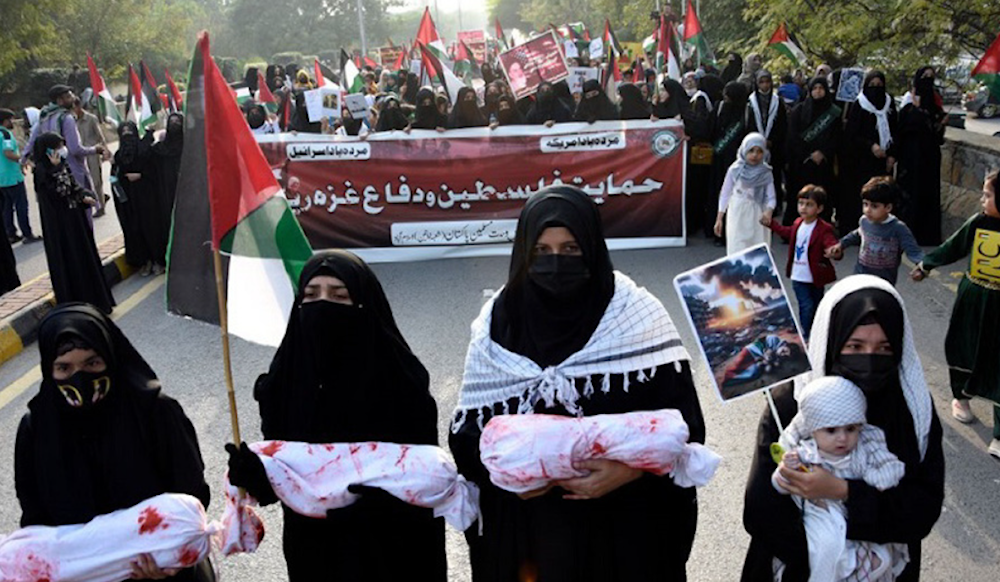Protesters demand action against US, UK ambassadors in Pakistan
A former PM, Mushtaq Ahmad, expressed that Pakistan needs to intervene following the Israeli invasion of Rafah and its use of hunger as a weapon.
-

Supporters of Majlis Wahdat-e-Muslimeen carry mock dead bodies during a protest against Israeli air strikes on Gaza, to show solidarity with Palestine, in Islamabad, Pakistan. (AP)
Pakistanis have demanded their government take decisive and real actions to ensure a ceasefire takes place in Gaza and build a humanitarian aid route for its citizens.
Demonstrators including students, lawmakers, and the media are participating in a week-long protest in front of the nation's parliament.
A former PM, Mushtaq Ahmad, expressed that Pakistan needs to intervene following the Israeli invasion of Rafah and its use of hunger as a weapon.
"Israel" has killed 35,903 Palestinians and injured 80,420 others in 232 days of genocide since October 7, according to the daily report by the Health Ministry in Gaza.
In March, the head of the political bureau of Hamas, Ismail Haniyeh, called on Pakistan's new government to take an active role in influencing "Israel" and its supporters to agree on an immediate ceasefire in Gaza.
Aamna Jangua, an organizer from the Save Gaza Campaign, stated that people are upset about the situation in Gaza because of a lack of breakthroughs and the bombing of Rafah, which was "the only sale place for Palestinians."
"15 lakhs [1.5 million] people are innocently suffering without medicines, without food, without a drop of water," Jangua continued.
Protesters are also urging Pakistan's government to act against ambassadors of complicit nations like the US and the UK.
Demonstrators also demanded Pakistan join South Africa's genocide complaint against "Israel" before the International Court of Justice (ICJ).
Another protester expressed that the US has touted human rights in the world, but "now, this genocide is supporting US interests, so now the US is supporting genocide."
Protesters pledged to continue their demonstration until the Pakistani government takes action against the US-Israeli massacre in Gaza.
Hamas welcomes ICJ ruling on Rafah, says it was insufficient
The top United Nations court on Friday ordered "Israel" to "immediately" halt military attacks on Rafah, marking a landmark ruling that is expected to heighten international pressure on the occupation entity more than seven months into its genocidal war on the Gaza Strip.
The International Court of Justice (ICJ) also ruled that "Israel" must keep open the key Rafah crossing for "unhindered" humanitarian aid and urged the "unconditional" release of captives taken by the Palestinian Resistance since October 7.
The Palestinian Resistance movement welcomed the decision of the ICJ, having called on the Israeli occupation to halt its aggression against the city of Rafah immediately and demanded that "it stop all measures that lead to genocide, allow aid into all areas of the Gaza Strip, and allow UN committees to enter to investigate the crimes of genocide."
ICJ rulings are legally binding, but the court has no concrete means to enforce them.
The ICJ said "Israel" must "immediately halt its military offensive, and any other action in the Rafah Governorate, which may inflict on the Palestinian group in Gaza conditions of life that could bring about its physical destruction in whole or in part."
The court on Friday also ordered "Israel" to ensure "unimpeded access" to UN-mandated investigators to look into allegations of genocide.
Pretoria brought the case before the ICJ last year alleging that "Israel's" war on Gaza breached the 1948 UN Genocide Convention. In a ruling on January 26, the court ordered "Israel" to do everything it could to prevent acts of genocide.
The latest ICJ ruling drew responses from several sides worldwide.

 4 Min Read
4 Min Read










